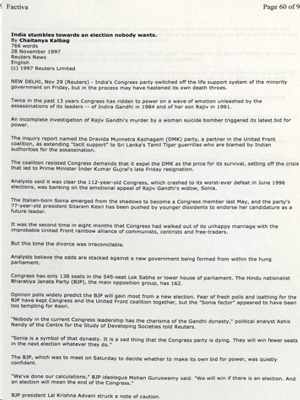India stumbles towards an election nobody wants
[Reuters]
Published date: 28th Nov 1997
28 November 1997
Reuters News
English
(c) 1997 Reuters Limited
NEW DELHI, Nov 29 (Reuters) – India’s Congress party switched off the life support system of the minority government on Friday, but in the process may have hastened its own death throes.
Twice in the past 13 years Congress has ridden to power on a wave of emotion unleashed by the
assassinations of its leaders — of Indira Gandhi in 1984 and of her son Rajiv in 1991.
An incomplete investigation of Rajiv Gandhi’s murder by a woman suicide bomber triggered its latest bid for power.
The inquiry report named the Dravida Munnetra Kazhagam (DMK) party, a partner in the United Front coalition, as extending “tacit support” to Sri Lanka’s Tamil Tiger guerrillas who are blamed by Indian authorities for the assassination.
The coalition resisted Congress demands that it expel the DMK as the price for its survival, setting off the crisis that led to Prime Minister Inder Kumar Gujral’s late Friday resignation.
Analysts said it was clear the 112-year-old Congress, which crashed to its worst-ever defeat in June 1996 elections, was banking on the emotional appeal of Rajiv Gandhi’s widow, Sonia.
The Italian-born Sonia emerged from the shadows to become a Congress member last May, and the party’s 77-year-old president Sitaram Kesri has been pushed by younger dissidents to endorse her candidature as a future leader.
It was the second time in eight months that Congress had walked out of its unhappy marriage with the improbable United Front rainbow alliance of communists, centrists and free-traders.
But this time the divorce was irreconcilable.
Analysts believe the odds are stacked against a new government being formed from within the hung parliament.
Congress has only 138 seats in the 545-seat Lok Sabha or lower house of parliament. The Hindu nationalist Bharatiya Janata Party (BJP), the main opposition group, has 162.
Opinion polls widely predict the BJP will gain most from a new election. Fear of fresh polls and loathing for the BJP have kept Congress and the United Front coalition together, but the “Sonia factor” appeared to have been too tempting for Kesri.
“Nobody in the current Congress leadership has the charisma of the Gandhi dynasty,” political analyst Ashis Nandy of the Centre for the Study of Developing Societies told Reuters.
“Sonia is a symbol of that dynasty. It is a sad thing that the Congress party is dying. They will win fewer seats in the next election whatever they do.”
The BJP, which was to meet on Saturday to decide whether to make its own bid for power, was quietly confident.
“We’ve done our calculations,” BJP ideologue Mohan Guruswamy said. “We will win if there is an election. And an election will mean the end of the Congress.”
BJP president Lal Krishna Advani struck a note of caution.
“The one imponderable in this situation is President (K.R.) Narayanan,” he said. “Nobody knows which way he will move.”
Narayanan occupies a traditionally titular post, but can wield enormous power in a hung parliament. He has told Gujral to stay on as caretaker prime minister, and can either ask Congress or the BJP to try to form a new government — or dissolve parliament and call fresh elections.
“The president is going to be an independent force,” Nandy said. “He wants to go down in history as someone who’s done good for the Republic. He will be a constitutionalist president.”
Narayanan served notice about his autonomy last month by refusing to sign off on the dismissal of a minority government in the northern state of Uttar Pradesh- giving it a chance to wean away defectors from other parties and stay in power.
India has seen six prime ministers in eight years, and experts say the country is very likely to see another coalition government replacing the felled United Front.
A new election would be a very expensive affair. Analysts estimate political parties alone will have to cough up 60 billion rupees ($1.5 billion) in campaign funds. The government will have to spend billions more on the machinery for 540 million voters.
The BJP’s Advani, asked if India could afford another election, said: “Sometimes in a democracy it is more expensive not to hold an election than it is to hold one.”
But with the economy slowing markedly, the rupee at all-time lows against the U.S. dollar, and stock markets poised to plummet on the political uncertainty, India is ending its 50th year of independence in sombre mood.
(c) Reuters Limited 1997






